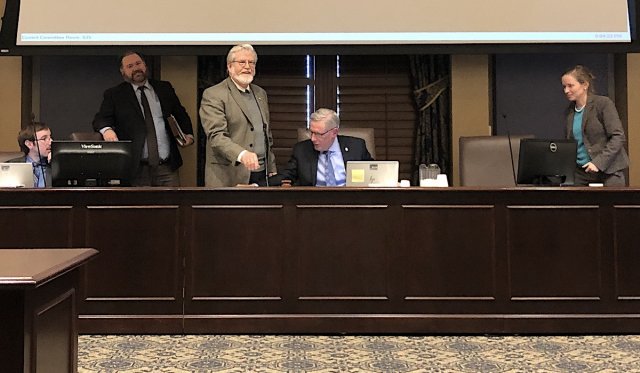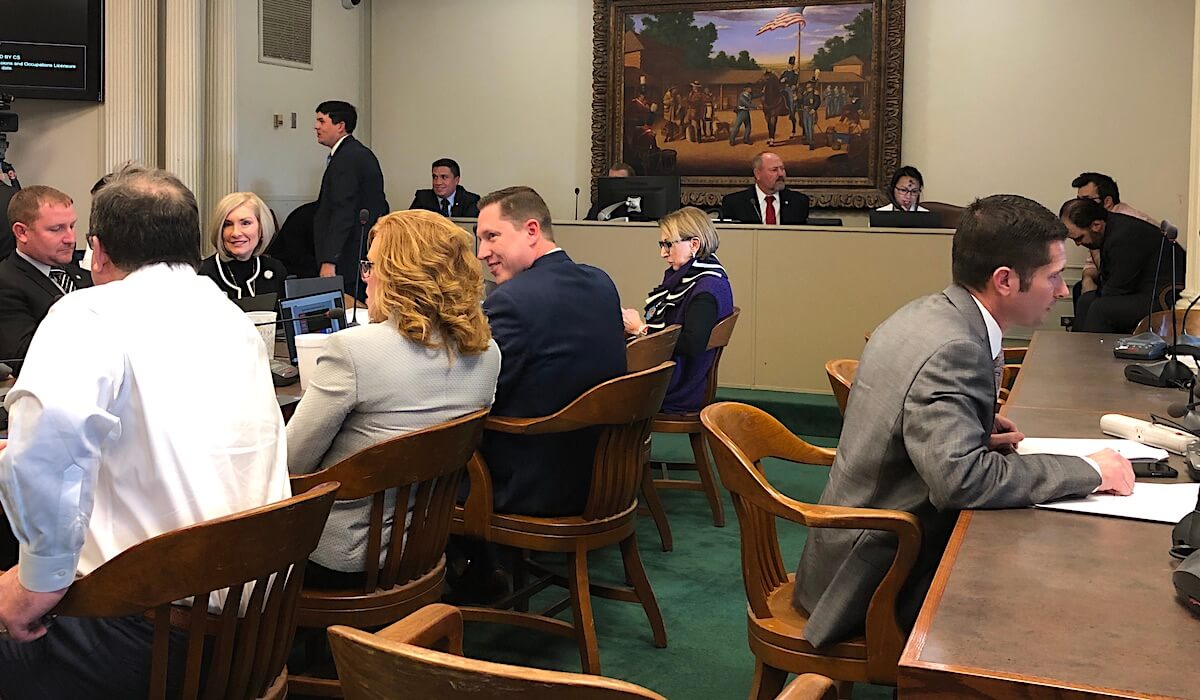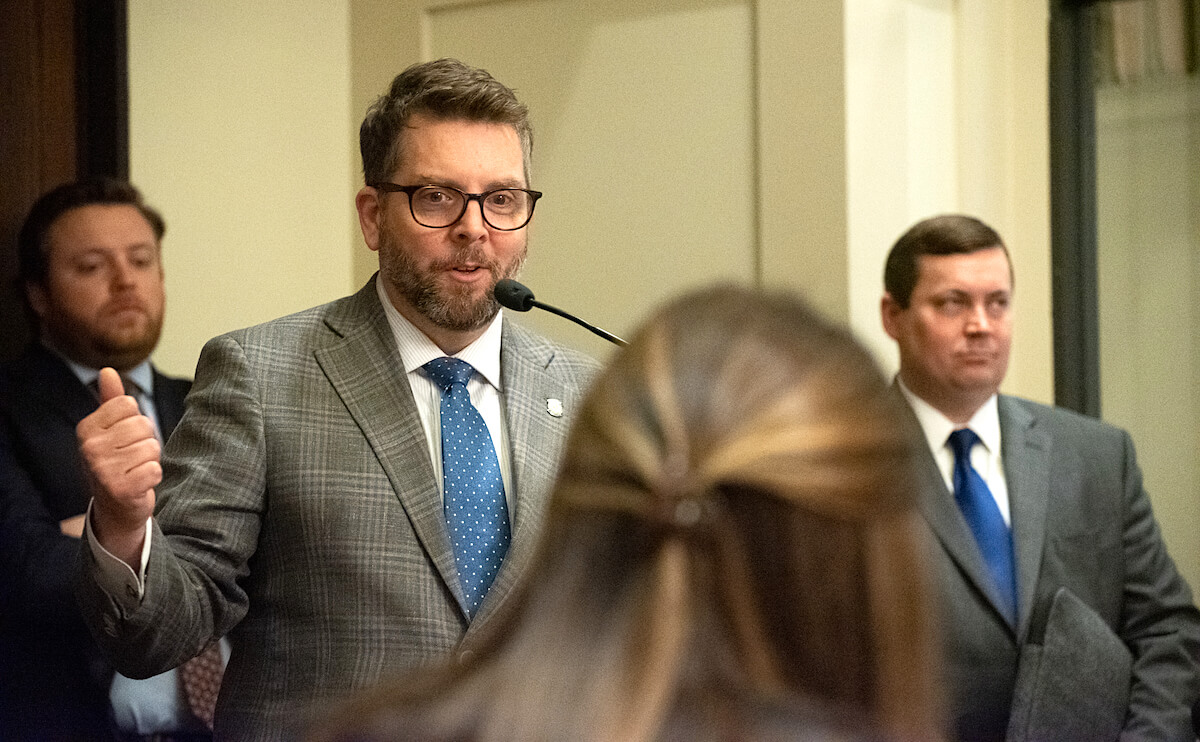

Meetings of the House and Senate Joint Committees on Appropriations and Budget fizzled Wednesday, as complex negotiations over Gov. Kevin Stitt’s proposed Medicaid program waiver delayed consideration of a bill to expand a hospital fee that would help fund Oklahoma’s portion of Medicaid expansion.
Uncertainty over Gov. Kevin Stitt’s SoonerCare 2.0 proposal — which would expand Medicaid and seek a federal waiver to implement nontraditional program features, potentially including the controversial managed care concept — delayed consideration of the hospital fee bill that appeared on House and Senate JCAB agendas late Tuesday.
“Negotiations on SoonerCare 2.0 are ongoing,” said Baylee Lakey, Stitt’s communications director.
Chairman: Expect ‘a JCAB sometime this week’

The House JCAB convened shortly before 11:30 a.m., immediately went into recess, returned more than four hours later and ultimately adjourned without action.
“I call the meeting (back) to order, and we are also going to adjourn the Joint Committee of Appropriations (and Budget) for Wednesday, Feb. 26,” Chairman Kevin Wallace said shortly before 4 p.m. “We will end up having a JCAB sometime this week.”
The Senate also convened, recessed and adjourned its JCAB late Wednesday.
“Negotiations are ongoing,” Wallace (R-Wellston) said after his meeting.
While Wallace was gaveling out, the regular Senate Appropriations and Budget Committee was a floor above in the Oklahoma State Capitol, slogging through a 68-bill agenda it started around 10 a.m.
Chairman Roger Thompson (R-Okemah) was present during afternoon Senate floor proceedings, but his involvement in SoonerCare 2.0 negotiations kept him from much of the Senate appropriations meeting, which spanned the morning and the late afternoon. Thompson returned to the meeting around 5 p.m.
At that point, Thompson recessed the standard appropriations committee meeting, reconvened Senate JCAB, adjourned it and resumed the first appropriations meeting.
“What just happened?” a senator lightheartedly asked staff sitting nearby.
After the regular Senate appropriations meeting adjourned around 6:20 p.m., Thompson said the day’s fiscal discussions were fruitful.
“We left the meetings today with what we needed to do to be able to meet the fiscal needs of SoonerCare 2.0,” Thompson said. “And we’ll see whether that is going to happen.”
Hospital fee questioned by hospital association
Senate and House JCAB members were scheduled to consider SB 1046 in the Wednesday meetings that never got off their launch pads. The bill proposes a $75 million expansion of a hospital fee, which would be used to help trigger a $1-to-$9 federal match of Medicaid expansion funding. SoonerCare 2.0’s version of Medicaid expansion would carry an estimated price tag between $125 million and $150 million.
Private general hospitals already participate in a “supplemental hospital offset payment program” (SHOPP) by paying the Oklahoma Health Care Authority a fee not to exceed 4 percent of their annual revenue. That fee already helps Oklahoma qualify for additional federal dollars to pay for the state’s existing Medicaid populations, including children, pregnant women, disabled individuals and low-income parents.
“The Senate’s position has been that we were at 3.25 (percent) as the JCAB (bill) said on SHOPP, and that’s still our position,” Thompson said late Wednesday. “And at this time, we don’t plan to go any higher.”
The additional hospital fee revenue could be used to fund whichever version of Medicaid expansion is ultimately implemented in Oklahoma. Up for an eventual 2020 statewide vote, State Question 802 would amend the Oklahoma Constitution to expand Medicaid coverage for an estimated 150,000 low-income adults and would prohibit many of the additional requirements sought by Stitt.
As a result, the governor and Republican legislative leaders oppose SQ 802’s constitutional requirement and instead are working to create SoonerCare 2.0, which would first expand Medicaid and then seek a federal waiver to implement managed care, slight premiums, work requirements and other nontraditional Medicaid features on the newly expanded adult population.
RELATED
A Medicaid expansion showdown 10 years in the making by Tres Savage
“The governor is committed to creating a plan that focuses on outcomes and cost containment,” said Lakey, Stitt’s communications director. “We will continue to engage in a transparent and robust dialogue as we work to develop an option that is right for Oklahoma.”
Under Oklahoma law, critical access hospitals — a federal designation for eligible rural facilities — are exempt from making SHOPP payments to the Oklahoma Health Care Authority, which operates the state’s Medicaid program, also called SoonerCare.
According to 2018 numbers, at least 40 rural hospitals in Oklahoma have the critical access designation. State hospitals, federal hospitals, tribal hospitals, specialty hospitals, children’s hospitals and long-term care hospitals are also exempt from making SHOPP payments.
That means the majority of new SHOPP dollars would also be paid by urban and suburban hospitals. Combined with concern over managed care, that prompted Oklahoma Hospital Association president Patti Davis to release a statement shortly after the House JCAB adjourned Wednesday.
“The OHA has several concerns with the bill as it is drafted,” Davis said of SB 1046. “OHA is concerned about hospitals bearing a disproportionate burden of funding this program with no protections against harmful commercial managed care initiatives in the future.”
Davis said the Legislature’s timing on the SHOPP proposal is also an issue.
“Imposing a 60-day notice to the 65 hospitals assessed under SHOPP is an unrealistic and highly problematic timeline,” Davis said. “Hospitals prepare annual budgets, and fiscal years vary by hospital. Hospitals will not have adequate time to budget for this July 1 expenditure, and that could cause significant issues, especially for already struggling rural hospitals upon which Oklahoma patients rely.”
Managed care uncertainty helps lead to delay
Ambiguity in Stitt’s proposal to implement Medicaid managed care — the use of an intermediary to orchestrate health care services for a specific population with the goal of controlling costs and improving outcomes — has led to urban and rural lawmakers alike hearing concerns from hospital administrators. Top managed care organizations include for-profit companies that have created mixed results in other states.
“In the Senate, we kept the finance away from the delivery,” Thompson said. “And even today, the governor has not made a decision on how we will deliver the care. So there are rumors going out that we are going to managed care. That’s just a rumor. That’s not been decided at all.”
Were the House and Senate joint appropriations committees to advance SB 1046’s new hospital fee without specific details about Stitt’s managed care proposal, however, some lawmakers feared the Legislature would lose leverage in 2020’s highest-profile policy debate.
“I think that causes discussion,” Thompson said. “For me personally, I’m always concerned about the welfare of the people. But keep in mind that the Legislature has never directed how care is carried out. Whenever the (Oklahoma) Health Care Authority was started in 1992, they were instructed to take care of the people of Oklahoma. And while we have talked about InsureOklahoma or Aged, Blind and Disabled — we’ve said we’ve got ditches on both sides — but we’ve left the executive branch to be able to do that. Now, are there ongoing discussions? Absolutely.”
Minutes before Wednesday’s House JCAB meeting convened, the Oklahoma Policy Institute distributed an email about the pending SB 1046 vote, calling it “an attempt to fund the governor’s hastily assembled and untested plan.” OPI asked people to call their legislators and ask that they vote against the bill.
OPI has strongly endorsed SQ 802 and has encouraged the Legislature to expand Medicaid for much of the past decade.
(Editor’s note: The Oklahoma Hospital Association is a sponsor of the Sustainable Journalism Foundation.)





















